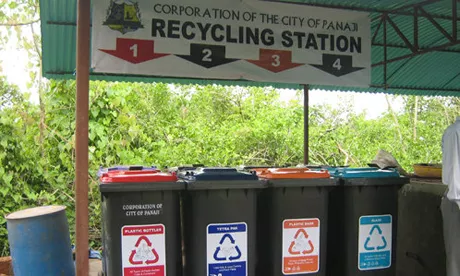
India has got a monumental garbage problem. Most municipal corporations in the country are still trying to get their hands on the right technology for waste disposal. But the real problem is how to integrate waste-disposal technology with a system of household-level segregation so that waste does not end up in landfills, but is processed and reused. Segregation at source should therefore be at the heart of municipalities’ solid waste management systems.
One of the cities that has truly adopted segregation is Panaji, Goa’s capital. The Corporation of the City of Panaji (CCP) has put in place a citywide system that is designed to collect household waste on different days for various waste streams. This ensures separation of garbage.
Along with this system, CCP also imposes penalties for non-segregated waste and has promoted colony-level processing as well. Most importantly, for the bulk of commercial establishments such as hotels, the civic body has a bag-marking system so that any non-compliance can be identified and fined.
CCP has been successful in a number of initiatives — this includes moving towards a zero-waste, landfill-free city. Panaji is presently a 100 per cent bin-free city with 100 per cent success in door-to-door collection of garbage and segregation of garbage at source. Garbage segregation into wet and dry fractions is strictly enforced.
Residential/housing colonies and commercial establishments segregate their waste into the two fractions. It is mandatory for housing colonies and commercial establishments (hotels/ restaurants) to segregate their waste into a minimum of five fractions which include one wet waste fraction and four dry waste fractions (plastic, paper/cartons, metal/glass and non-recyclable fractions).
Despite the many challenges, Panaji has been successful in educating its citizens on the need to segregate waste and has also managed to gain the support of the community.
Processing of wet waste at source
At the residential colony level, the wet waste collected is transferred to the decentralised compost stations present within these colonies. With 65 such composting stations set up in the city, Panaji composts over 70 per cent of the wet waste that it generates. Further, residential colonies are encouraged to set up kitchen gardens and composting stations (with a capacity to process 100-150 kg of wet waste) within their campuses.
Around 120 colonies are effectively running this system to manage wet waste. It is mandatory for all newly constructed colonies to have a composting/dry waste segregation facility. Currently, the maintenance of these decentralised units is done by the municipal corporation with the understanding that the responsibilities will be transferred to colony managements in due course. The CCP collects Rs 1 per day per household for the waste collection and processing facility.
No effort from urban local bodies can be a success without the citizens’ buy-in. While there has been resistance to the segregation process from some quarters, the citizens of Panaji have by and large supported the efforts of the CCP in the solid waste management process.
Bulk garbage generators
With Panaji city attracting tourists throughout the year, the amount of waste generated by bulk garbage generators such as hotels is huge. The city has strict norms in place for segregation of waste by bulk generators. Here again, waste is segregated into three-four fractions by these waste generators. The dry waste is transported to the centralised dry waste processing facility where it is further segregated. Wet waste is either processed at the waste generator’s (own) facility or is collected by sanitation workers at a specified time to be transported to a centralised wet
waste-processing facility in the city.
Each bulk generator is given a number tag. Number-tagging of wet waste is done to identify generators sending mixed waste to the waste-processing facility. CCP collects anywhere between Rs 600-11,000 per month for the waste collection and processing facility that it provides.
Centralised dry waste processing centre
All dry segregated waste collected is transported to the material recovery facility. A material recovery system has been put in place, where waste is segregated into recyclable and non-recyclable waste at the sorting and segregation station at St Inez. The recyclable waste is further segregated into 20 fractions and auctioned off every week. The non-recyclable material is sent to cement kilns.
So far, close to 2,464 tonnes of non-recyclable waste has found its way to cement kilns. Every week three trucks carrying 8-10 tonnes of waste each, ply between the dry waste facility and the cement kilns, located 600 km away from the city.
The CCP has also acquired a Styropactor to create compact bundles of loose Thermocol and a Mulcher which aids in the process of shredding horticulture and garden waste for effective use in further processing of organic waste.
In the period between February 2014 and October 2015, around 926 tonnes of recyclable material (including paper, cardboard, glass, plastic bags, Tetra Pak packages, hard plastic, PET bottles, aluminium, metal, cloth, plastic, Thermocol and silver foil), has been sold by the facility.
Waste-reduction measures at the city level
A number of waste reduction measures have been enforced within the city. These include:
•Usage of steel, ceramic or biodegradable plates by street stalls and vendors over paper plates, and the reduction of use of sachets for condiments.
•Mandatory segregation of waste for stalls coming up during exhibitions and events (into six fractions — wet waste, plastic PET bottles, metal/glass, Tetra Pak packages and hard plastic).
•Training sessions on segregation, MSW guidelines, etc., for event management agencies to ensure that minimum quantities of waste are generated during event periods.
•Mandatory segregation of waste by commercial establishments, hotels, cafeterias, etc., at source as dry and wet waste in green and black bins/containers within their premises (green and black trolley bins can be purchased at Rs 3,000 per bin).



